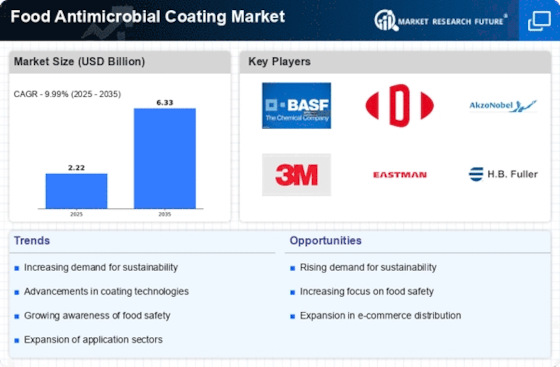Top Industry Leaders in the Food Antimicrobial Coating Market

The Food Antimicrobial Coating Market has witnessed significant growth owing to increasing concerns about food safety and the need to extend shelf life.
Strategies Adopted
Strategies adopted by these industry leaders revolve around product innovation, geographic expansion, and collaborations. Agion Technologies, renowned for its silver-based antimicrobial coatings, has focused on expanding its market reach by partnering with major food packaging companies. BASF SE has emphasized research and development, introducing eco-friendly coatings that adhere to regulatory standards while offering enhanced antimicrobial properties. DowDuPont Inc. has pursued mergers and acquisitions to strengthen its position, acquiring smaller players to diversify its offerings.
Market Share Analysis
Factors influencing market share analysis in this sector encompass product efficacy, regulatory compliance, pricing strategies, distribution networks, and customer relationships. Companies investing in advanced R&D to develop coatings with superior antimicrobial properties and longer durability tend to capture larger market shares. Additionally, adherence to stringent food safety regulations and certifications plays a crucial role in establishing credibility and gaining consumer trust.
Emerging Companies
New and emerging companies are disrupting the market by introducing novel technologies and alternative antimicrobial solutions. Start-ups like Nano-Care Deutschland AG and Parx Materials NV are gaining traction with their nanotechnology-based coatings, showcasing promising antimicrobial effectiveness and environmental sustainability. These emerging players are challenging established norms and reshaping industry standards through their innovative approaches.
Industry news in the food antimicrobial coating sector frequently revolves around technological breakthroughs, regulatory updates, and strategic collaborations. Recent advancements include the development of multifunctional coatings combining antimicrobial properties with features like UV resistance and anti-corrosion capabilities. Regulatory shifts emphasizing sustainable and non-toxic coatings have spurred research into bio-based alternatives, reflecting a growing market demand for eco-friendly solutions.
Current company investment trends underscore a continued focus on R&D initiatives aimed at creating next-generation antimicrobial coatings. Major players are allocating substantial resources to develop coatings that not only inhibit bacterial growth but also address emerging pathogens and maintain efficacy across diverse food contact surfaces. Furthermore, investments in production facilities and distribution networks are being made to ensure global market penetration and meet escalating consumer demand.
The overall competitive scenario in the food antimicrobial coating market remains dynamic and fiercely competitive. Incumbent players continually innovate to maintain their market positions, while new entrants disrupt the status quo with groundbreaking technologies. The market's future trajectory hinges on advancements in nanotechnology, biocompatible materials, and sustainable formulations, driving a shift towards safer, longer-lasting, and environmentally friendly coatings. Collaboration, innovation, and adaptation to evolving regulatory landscapes will be pivotal in shaping the competitive landscape of this burgeoning market.
Recent New :
BioCote Limited have dominated the market, leveraging their extensive product portfolios, R&D capabilities, and strategic partnerships, Industry competitive landscape is evolving, driven by technological advancements, stringent regulations, and the pursuit of innovative solutions.
Key players :
- KaroMD
- Solace Nutrition
- Dow Microbial Control
- AK Coatings
- Royal DSM
- I.Du Pont De Nemours & Company Diamond Vogel
- BASF SE
- Ppg Industries Inc











